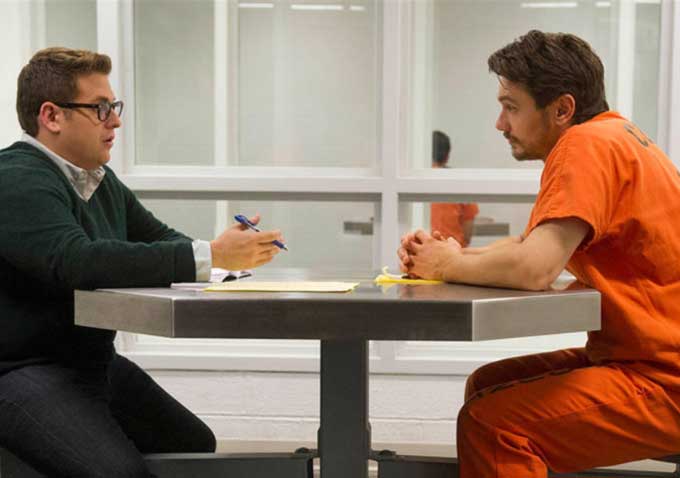True Story
by Jordan Canahai


True Story
Brian De Palma once said “the camera lies all the time—it lies 24 times per second.” I imagine he would have done a much more interesting job directing True Story than British filmmaker Rupert Goold has. The new mystery drama based on Michael Finkel’s memoir, True Story: Murder, Memoir, Mea Culpa, is told from Finkel’s point of view and details the recently-disgraced journalist’s relationship with Christian Longo, a man on trial for murdering his wife and three children. The book examines the elusive nature of truth, thus making it an ideal subject for the medium of film (in which everything on screen is an illusion.) Where it comes up short is in all the ways that an artist with a distinct point of view and a real understanding of the cinematic language would have made it a great film.

When True Story begins the New York Times journalist Finkel (Jonah Hill, in another impressive serious performance outside his standard comedic fare) is in Africa researching facts for the article “Is Youssouf Malé a Slave?” The content of the cover story, centered around a composite character, is proven dubious enough by outside members of the press that Finkel is sent packing by the Times for his coloring outside the lines (though after further research the real-life consensus since proved it was an understandable one-time incident, though it highlights the story’s major theme of how confusing translating multiple points of view as a journalist can be.) Disgraced and seeking redemption, Finkel returns to his Montana home with girlfriend Jill (Felicity Jones) when he comes upon an unlikely subject for his comeback story; Longo (James Franco) was recently arrested in Mexico for the murder of his family while using Finkel’s name and occupation as an alias. Finkel decides to travel to Oregon where Longo is being imprisoned and meet with the man, hoping to cover the trial and tell his side of the story.
From there True Story explores the strained and complicated relationship between the two unreliable narrators, each one in a personal low point and hoping to use the other for their own self-serving agendas. Hill does some very fine work, continuing to prove he’s a gifted young character actor, arguably one of the best of his generation. Despite the intrigue of the material and the chemistry Hill and Franco possess from their Apatow productions, their jail cell meetings don’t carry the tension required of the best thrillers. I can also imagine the movie would have been so much better with, say, someone as wildly talented as Hill’s Wolf of Wall Street co-star Leonardo DiCaprio in the Longo role, as Franco has yet to demonstrate he’s capable of tackling serious roles with Hill’s success.
Adapting Finkel’s book, screenwriter’s Goold and David Kajganich had an opportunity to expand the source material and make it something even stranger and richer on film, but the celebrated British theater director, making his debut feature, merely adapts Finkel’s story to the screen without infusing the text with the raw power unique to pure cinema. This is most obvious during the trial scenes, in which his use of flashbacks to the murder from multiple perspectives comes off as a simplistic and sloppy way of complicating the narrative rather than exploring the subjective nature of truth in a manner akin to Rashomon. In the end, True Story ends up being something of a curious failure, regardless of how closely it follows the real-life event that inspired it.
Watch the trailer for True Story
|
Issue Navigation> Issue Index > v14n15 (Local Music Issue, Week of Thursday, April 16) > True Story This Week's Issue • Artvoice Daily • Artvoice TV • Events Calendar • Classifieds |









 Current Issue
Current Issue